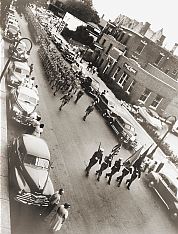1950-1959: DAYS OF CONFLICT, YEARS OF PROSPERITY
City men recall brutal conditions of Korean War
 |
 |
 |
 |
|
|
|
Warriors of Korean War
Members of Marine Company B, 18th Infantry Battalion, march down West Berry Street on Aug. 25, 1950, bearing both U.S. and UN flags. |
|
|
Marine veterans remember fierce fighting in bitter cold.
By
BOB CAYLOR of The News-Sentinel
On Aug. 25, 1950, barely five years after the end of World War II, 225 Marine reservists marched through the streets of Fort Wayne as hundreds of civilians lined their route to the railroad station.
Marines and civilians alike were quiet and somber along the march, the first leg of a journey that would take the men from Fort Wayne to Camp Pendleton, Calif., and finally to Korea.
The enlisted men were mostly in their teens, a generation that barely escaped World War II. Their officers were mainly veterans of World War II.
"You had a different kind of a spirit," said Kenneth Jennings of Decatur, who was among those Marines. "We figured we were stopping the spread of communism. Well, your country called and you went."
John Settle, who grew up in West Virginia, but has lived in Fort Wayne for 44 years, agrees. Settle was in boot camp at Parris Island, S.C., when the war began.
But both men would be drawn into the 1st Marine Division, 15,000 men trapped in the legendary torments at Chosin Reservoir.
War erupted in Korea on June 25, 1950, after North Korean army units pushed across the border of the divided peninsula. North Korea was communist and had a powerful new supporter: In 1949, Chinese communists finally won a civil war that had raged since the '30s. Newly communist China was in turn supported by the Soviet Union, which had just detonated its first atomic weapon.
The United States and a coalition of other United Nations countries supported the non-communist South Korean government.
At first, the war went very badly for South Korea. North Koreans surged across the country, seizing its capital, Seoul, among many conquests. American and other defenders of South Korea were on the defensive and falling back.
Landing at Inchon on Sept. 15, 1950, American and U.N. forces surged through the country and crossed into North Korea two weeks later. The United States and its allies pressed north nearly to the Yalu River, the boundary between Korea and China.
But China entered the war in October. Jennings and Settle faced Chinese forces for the first time late in November as a brutally cold winter descended on the combatants.
Nearly 50 years later, neither Jennings nor Settle can forget the ferocity of the Chinese attackers.
Jennings and his battalion of about 1,000 men were encamped in a small village about three miles south of the Yalu River. One night in late November, they were set upon by a division of Chinese soldiers -- 10,000 or more men -- who streamed at them from mountains surrounding the village.
"They came charging down, beating drums, blowing whistles," he remembers.
"We wiped that division out. . . . We killed many Chinese that night. Many, many, many Chinese. In fact, they were carrying them off in carts," he said.
Many Americans had to be carried off, too. Jennings said all but about 175 men in his battalion were killed or wounded.
Meanwhile, Settle was part of a mortar crew in a company of about 295 men charged with holding Tokang Pass, a narrow mountain pass. Later they would call it "Nightmare Alley."
For five nights in a row in late November and early December, they fought off attack after attack. The temperature fell to 20 degrees below zero at night as snow blanketed them from a moonless sky.
"They blew bugles and whistles and played cymbals" as they attacked, he said. "It sounded like a damn carnival."
"They walked right into machine guns. They fell like wheat," Settle said. As wounded Chinese piled up around the American positions, their groaning quieted slowly as they froze to death in the severe cold.
"The last two nights, we used Chinese bodies to build bunkers. They were frozen stiff," he said.
Settle's company took a terrible beating. When a battalion arrived to relieve their company, only 80 of the 295 men who defended the pass walked out.
"And some of them were wounded," he said.
Although Americans inflicted heavy casualties on enemy soldiers, the U.S. forces retreated. They were pressed south, ultimately back into South Korea.
Both men were so severely frostbitten in the retreat that they now receive disability payments because of their injured feet.
Settle remembers Korea as a crucial step in stopping the expansion of communism.
"This was the first major step the (United Nations) had taken against communism. If we didn't take that step, they would have overrun Korea and then used it as a steppingstone to Formosa and the other small countries," Settle said.
"We had the feeling a little guy was in trouble, and it was up to us to help him," he added.
Jennings speaks proudly of his time in Korea, but he's quick to add that war's not like the movies he grew up with.
"There's nothing glorious about it," he said. "You're just cold and miserable and scared to the devil."